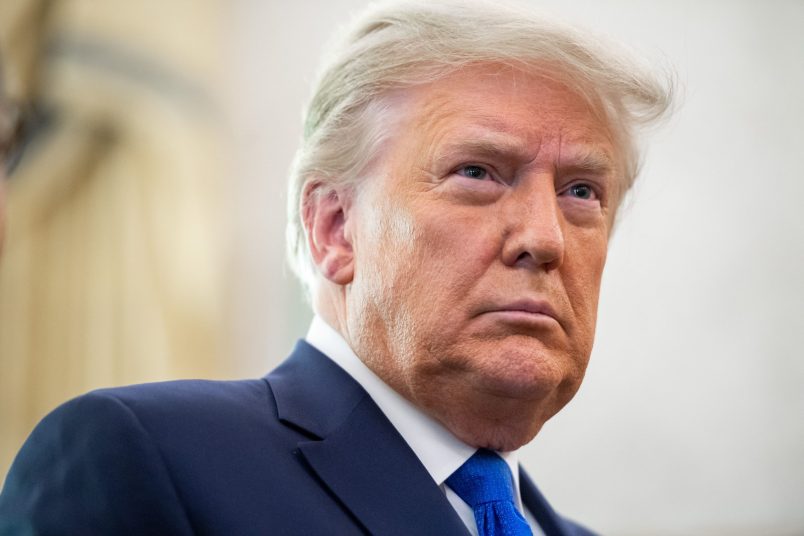You’ll remember that, in the waning days of the Trump presidency, a crew of conspiracy-theorizing loyalists pushed the president to use the federal government to seize voting machines and investigate his bogus claims of fraud.
Those plans never became reality, but Trump supporters did take matters into their own hands, breaching voting machines in locations around the country to try to substantiate Trump’s big lie.
Here’s what’s new: It turns out Trump was at a meeting where those nascent, unlawful efforts were also discussed — back in December 2020. Trump was present as allies discussed a plot to unlawfully access voting machine software in Michigan and Georgia, according to testimony heard by the Jan. 6 committee.
The advocacy group Free Speech for People sent a letter to top DOJ and FBI officials, including special counsel Jack Smith, highlighting part of testimony delivered to the House Jan. 6 committee about the now-infamous, wild Dec. 18, 2020 strategy session at the White House. That meeting, as detailed by various Trump allies, involved hours of screaming and insults as conspiracy theorists held forth and White House lawyers attempted to keep them at bay.
It also, the group noted, included early references to a plot to break into voting machines.
“The testimony available to the public shows that [Sidney] Powell, [Michael] Flynn and [Patrick] Byrne attempted to persuade Trump to issue an executive order that would, among other things, direct the seizure of voting machines by [sic] either the Department of Homeland Security or the Department of Defense,” the letter said. “The evidence also indicates that Rudy Giuliani and White House Counsels Pat Cipollone and Eric Herschmann opposed this plan, and succeeded in dissuading Trump from enacting it.”
Crucially, the letter noted, Giuliani opposed the plan to seize voting machines because, according to testimony, he believed Trumpworld would be able to access voting machine information anyway.
The letter cited testimony from former White House staff secretary and counselor Derek Lyons, who told the Jan. 6 committee that the Trump camp were discussing the plot.
“His point of view was that in some way the campaign, I believe, was going to be able to secure access to voting machines in Georgia through means other than seizure, that, you know, the access would be — I don’t know what the right word is, but, you know, voluntary, like it wouldn’t be coerced,” Lyons said at one point.
That, ultimately, came to pass, in Georgia’s Coffee County, Michigan’s Antrim County, and other locations that conspiracy theorists put under a microscope.
“I think there had been discussion of whatever happened in Michigan in the county that you had mentioned earlier in our conversation today, in terms of, you know, getting access to those—to voting machines,” Lyons told the panel later, when asked if he remembered specific states mentioned.
The group also cited an email that a Jan. 6 committee investigator said was sent by Sidney Powell to former White House chief of staff Mark Meadows and Trump’s assistant Molly Michael after the Dec. 18 meeting: “Georgia machine access promised in meeting Friday night to happen Sunday has not come through,” the email said, according to the investigator, who read it aloud during Giuliani’s testimony.
“This email suggests that (1) a plan to access voting machines in Michigan was developed but did not come to fruition,” the letter said, “and (2) a similar plan to access the voting system in Georgia on Sunday, December 20, 2020 was promised at the meeting with Trump, but did not come through.”
While the extent to which Trump may have been aware of the plot is still unclear, Powell and her fellow pro-Trump conspiracy theorists ultimately orchestrated a multipronged effort to breach voting machines in Georgia and Michigan that gave them access to sensitive voter data, according to reporting by the Washington Post and other outlets. The plot has reportedly been swept up in Fulton County District Attorney Fani Willis’ investigation into whether there was any criminal interference in Georgia’s 2020 election.
Meanwhile, the material taken from voting machines by Trump allies has repeatedly shown up in public, including, recently, at CPAC — part of an effort to keep Trump’s Big Lie alive that experts warn could compromise future elections. CNN also reported on Friday that operatives considered using the Coffee County material to push to decertify Georgia’s 2021 Senate election, an early plan to take the Big Lie beyond Trump’s presidential race.







Of course he was.
Things aren’t looking so rosy for the fat bastard today.
This needs some indictments.
He’s goin down. So is he and she and him and her and it and them.

Old news, which we have literally known about since the day after it happened.
Unpaywalled archive.is link.
But of course he was. It was probably his idea.